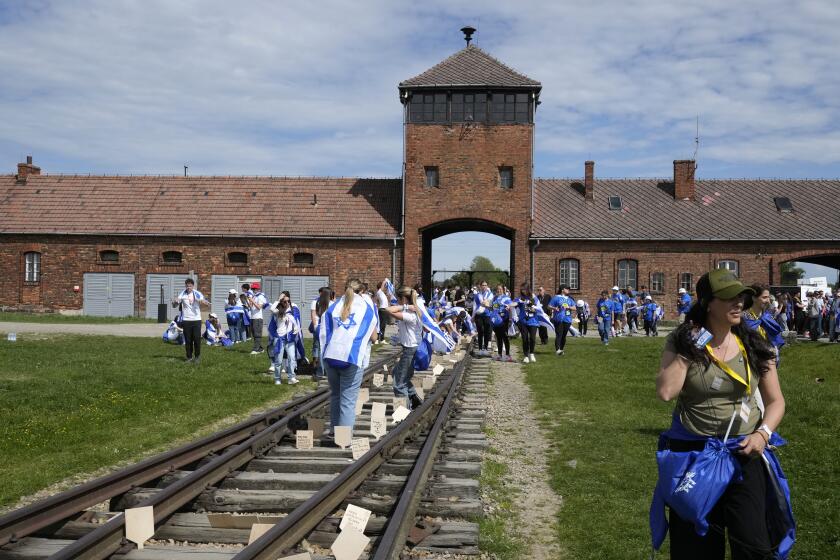Moscow Police Foil Communists’ Holiday Plans
Thousands of heavily armed riot police blocked an attempt Sunday by Russian Communists to celebrate their most sacred holiday, Revolution Day, in the streets of Moscow.
Turned away from Red Square and other rallying points with little coercion and few arrests, about 500 Communists withdrew to a snow-blanketed birch forest just north of the city for their party’s smallest gathering here on this date since the event it commemorated--the Bolshevik overthrow of Russia’s post-czarist government in 1917.
The Communist retreat from the capital--and the relatively small and peaceful turnouts at legal rallies elsewhere across Russia--indicated that President Boris N. Yeltsin will be able to carry out early elections of a new Parliament as planned Dec. 12 without serious resistance or boycotts.
Sunday’s demonstrations were the first hard-line challenge to Yeltsin since he closed the old Communist-dominated Parliament, ordered the early elections and attacked the building with army tanks Oct. 4 to end a rebellion by its leaders.
Fearing an outburst of new violence, the government banned Revolution Day rallies in Moscow for the first time since the Soviet Union collapsed in December, 1991.
The threat to defy that ban diminished when the Communist Party of the Russian Federation, the largest remnant of the party that ruled the Soviet Union for seven decades and the only Communist faction eligible for the coming elections, urged its supporters in Moscow to stay home, fearing that it might be outlawed if there was disorder.
Those who did take to the streets, it turned out, were older and less aggressive than the anti-Yeltsin militants who swarmed through Moscow just five Sundays ago. This time the crowds seemed leaderless and puzzled when confronted by police with tear-gas guns, steel helmets, flak jackets, water cannon mounted on trucks and aluminum shields the size of car doors.
At October Square, scores of demonstrators emerging from the subway station with red Communist banners met a line of police blocking their path to Moscow’s biggest statue of revolutionary leader V. I. Lenin, where they had planned the day’s main rally.
“You are disturbing the public order. Go home,” blared the loudspeaker atop an armored personnel carrier. A police official on the line seconded though a bullhorn, “Esteemed comrades, it is illegal to gather here.”
“You address us in the wrong manner,” an elderly woman shouted back. “You are not our comrades. You are fascists!”
Instead of being provoked, the officers looked bored. “Wake up!” one commander shouted, whipping his men into line. And instead of charging forward, the demonstrators shuffled backward into the Metro, some of them shrieking, as the wall of police shields advanced. Seven people were arrested there and several others elsewhere in Moscow.
At Red Square, where on this day in years past Soviet leaders stood atop Lenin’s mausoleum and reviewed the biggest of their parades, police and large trucks blocked all but one entrance. There they set up metal detectors to screen the steady file of Muscovites and tourists let in to view Lenin’s embalmed body. Some laid flowers at the tomb.
The Interior Ministry deployed at least six water cannon and several thousand riot police around Moscow, including 1,000 men at October Square alone.
Police in St. Petersburg allowed a few thousand Communists to rally along the Neva River near the cruiser Aurora, which fired the first shot of the 1917 Revolution, but kept them out of the city center.
The rallies in Moscow were attempted by the few parties barred from or shunning the election campaign--the National Salvation Front, Working Russia, the Russian Communist Party, the Party of Bolsheviks and Unity in the Name of Leninism.
But the gathering in Medvedkovo forest, a quarter-mile beyond the outer ring road around Moscow, revealed serious resistance to their leaders’ strategy urging voters to stay home on election day.
Several people in the crowd accosted Anatoly V. Kryuchkov, a Communist leader, after he closed the rally with a pro-boycott speech.
“By no means do I support Yeltsin, but I cannot accept the idea that by not voting we can achieve something in our struggle against him,” said Valentina Tikhonova, an economist in the crowd.
Sergei Loiko, Andrei Ostroukh and Alexei Kuznetsov of The Times’ Moscow Bureau contributed to this report.
More to Read
Start your day right
Sign up for Essential California for news, features and recommendations from the L.A. Times and beyond in your inbox six days a week.
You may occasionally receive promotional content from the Los Angeles Times.






